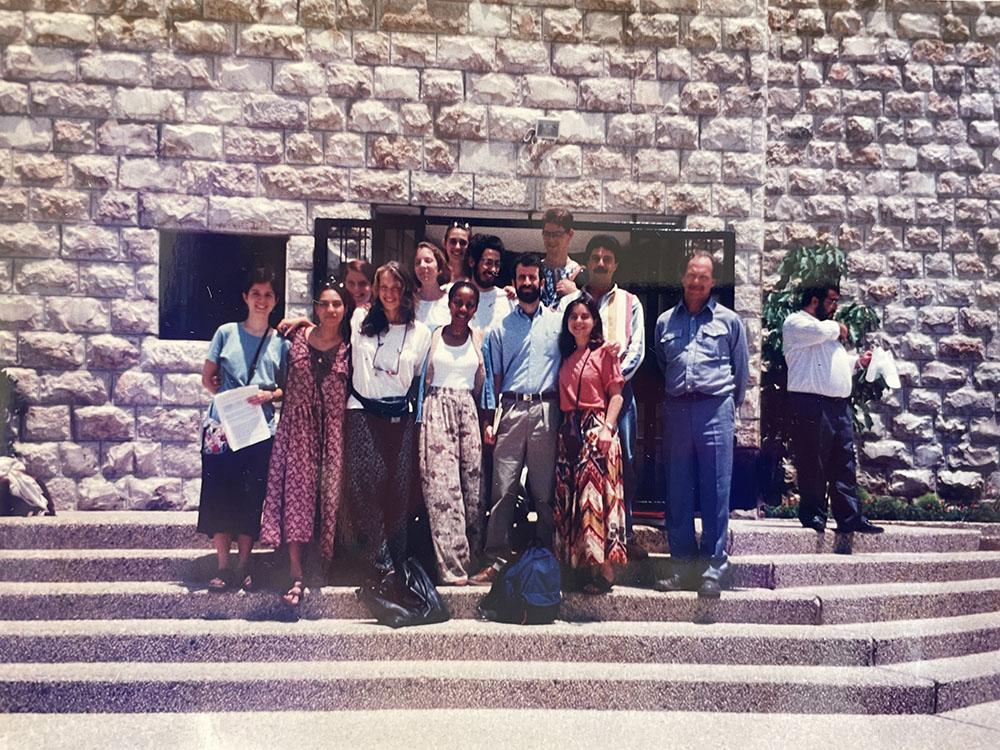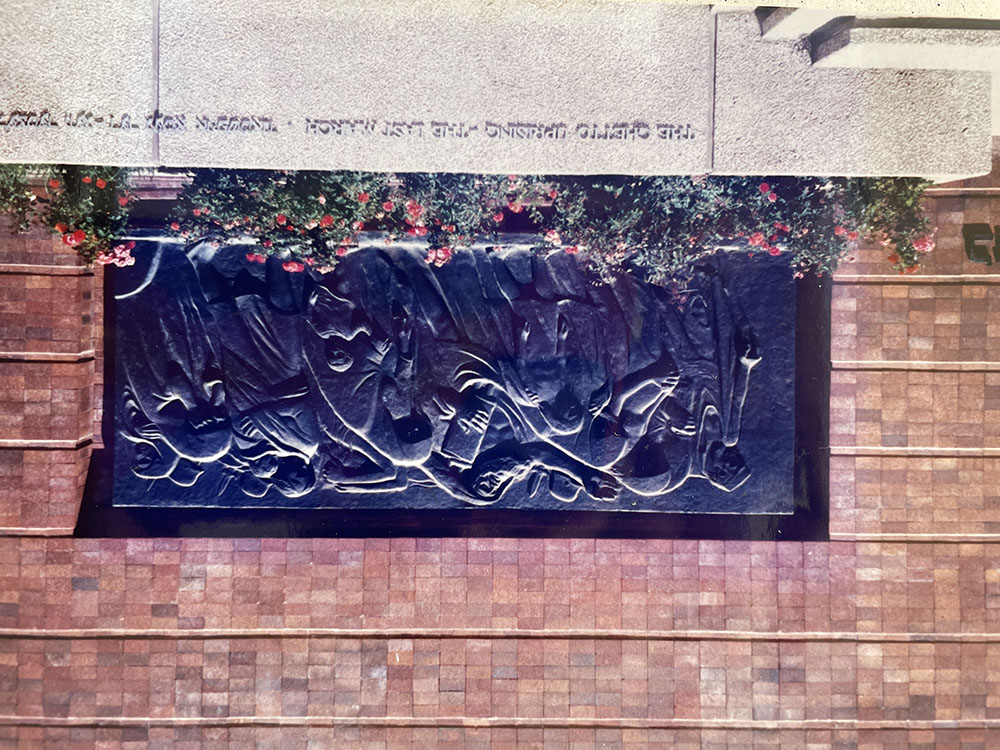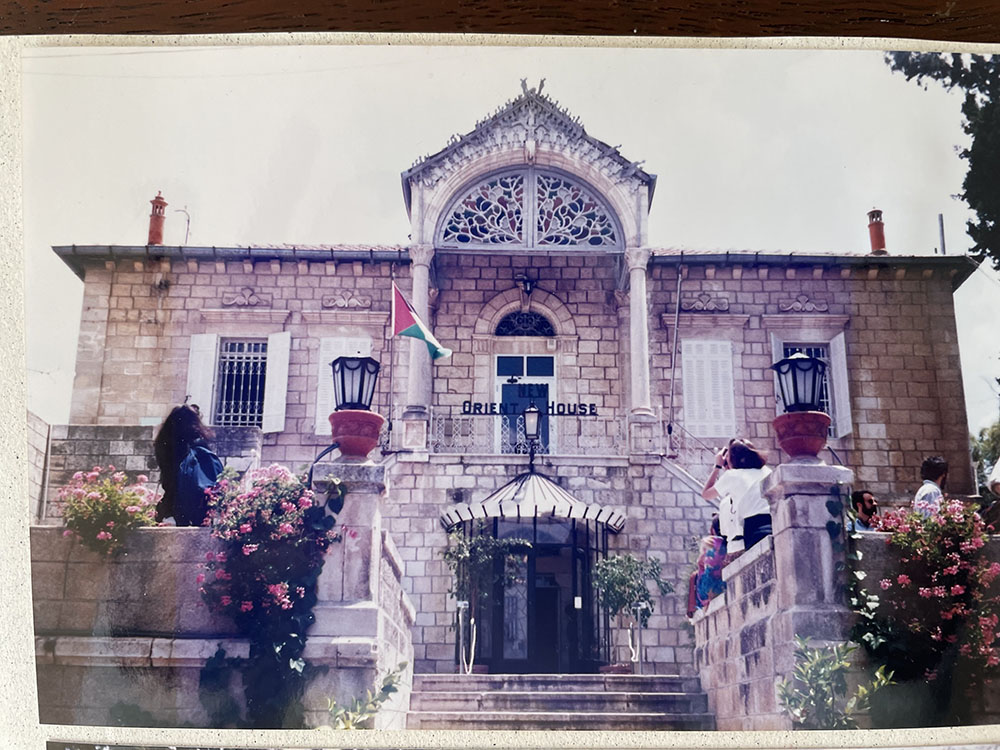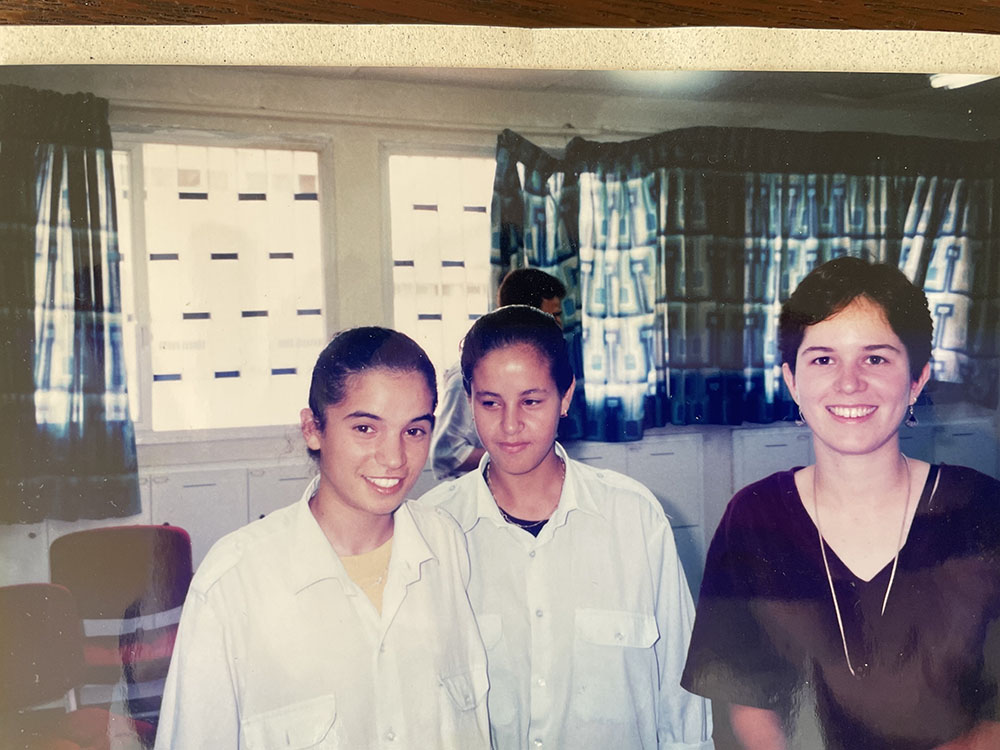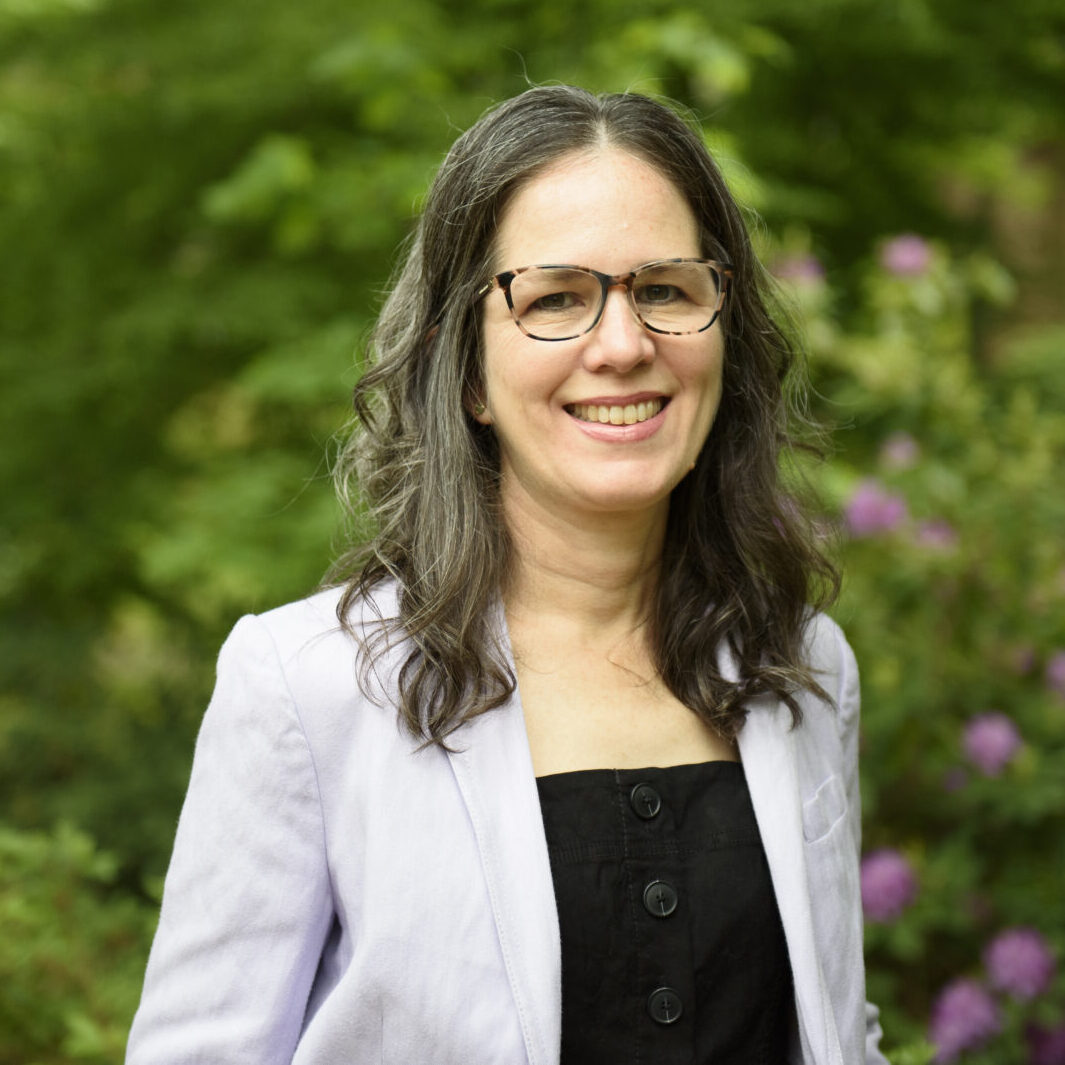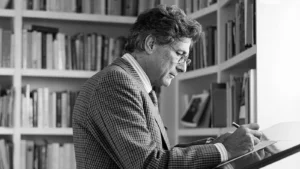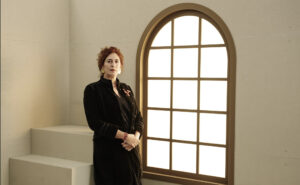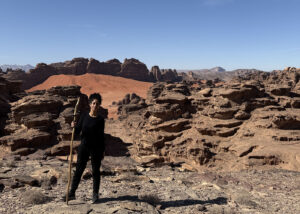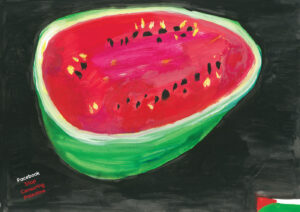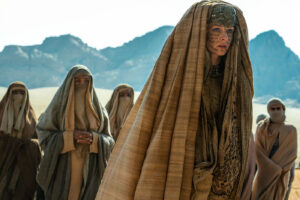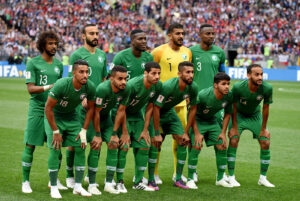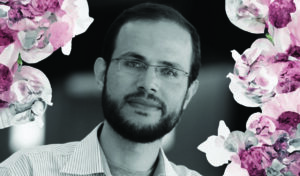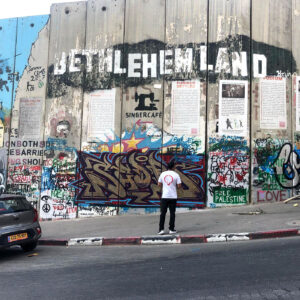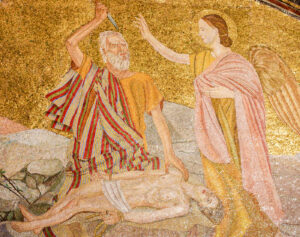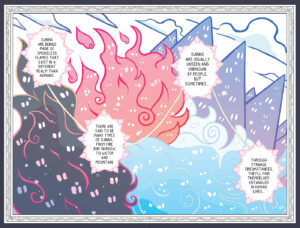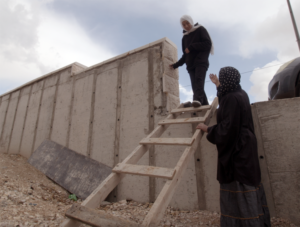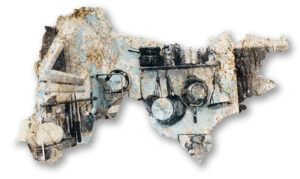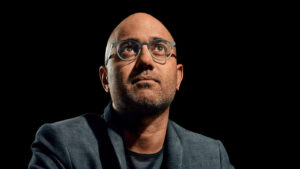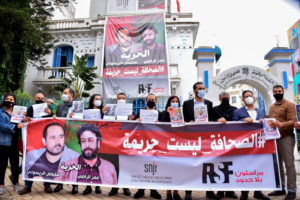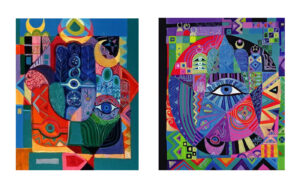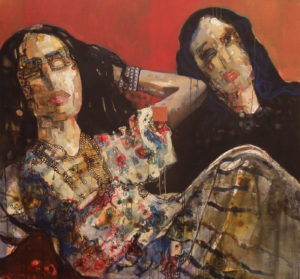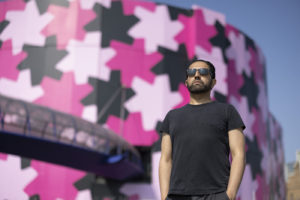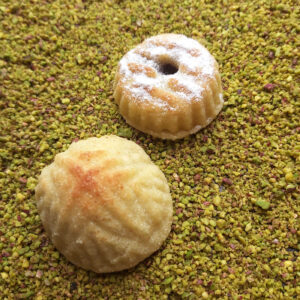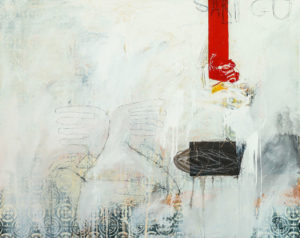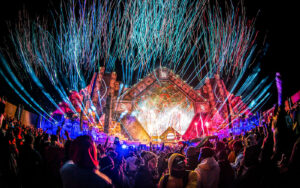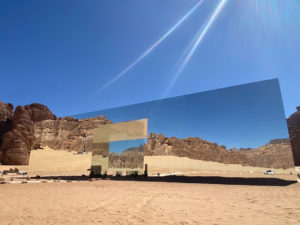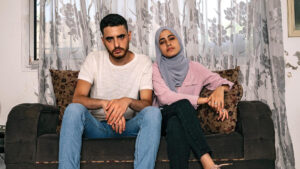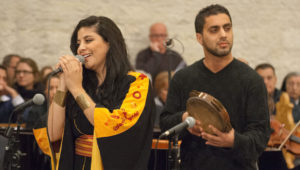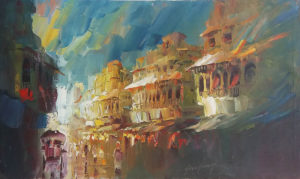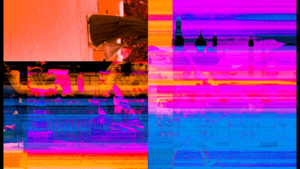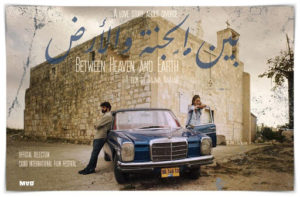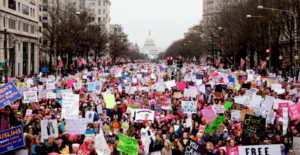“Here’s the script: Criminalize the boycotts, deport the human rights advocates, rebrand anti-Zionism as anti-Semitism, smear the leftist Jews, infiltrate the leftist organizations, defund the aid programs, torpedo the political campaigns, fire the high school teachers and speech pathologists and network commentators, and pinkwash the occupation. The tactics vary today, but the intent remains the same. For as long as I have been alive, the barriers in the West to advocating for Palestinian rights have deterred all but the most committed people.
“Often, as a result, the responsibility has fallen on the shoulders of Palestinians.”
—Kaleem Hawa, “Present Absenses: A Century of Struggle in Palestine“
Eman Quotah
I expected to love this class. I hate it.
Once a week, I make the long shuttle trip from Swarthmore College to Bryn Mawr College. Sometimes, there’s an hour-long stopover at Haverford College. It is Ramadan, February 1994, and I am fasting. I bring a snack — Doritos, dates, Pepperidge Farm cookies — to eat in seminar after the sun sets.
In conflict resolution studies class, we are preparing for what the three colleges call a spring-break “peace studies mission” to Israel and the Occupied Palestinian Territories. No one who planned this class seems to have been concerned about using the word “mission” to describe a learning experience about religious and ethnic conflict. The class is taught by a Jewish professor. I am not bothered by his Jewishness, or I hope that isn’t the case — I don’t know the phrase “unconscious bias” yet, but I’m aware of its possibility. In 1994, I just can’t imagine anyone letting a Palestinian or Arab professor lead this so-called mission without someone to provide an “alternative view,” “balance,” a different “perspective.”
Sometimes, after class, I eat late iftar with my two Palestinian Bryn Mawr friends at their dining hall.
I am the only Arab student in my class. I am one of two Muslim students. I am the only Arabic speaker. There are no Palestinians.
I want to believe Palestine will one day be free. So, I applied to be a part of the peace studies mission.
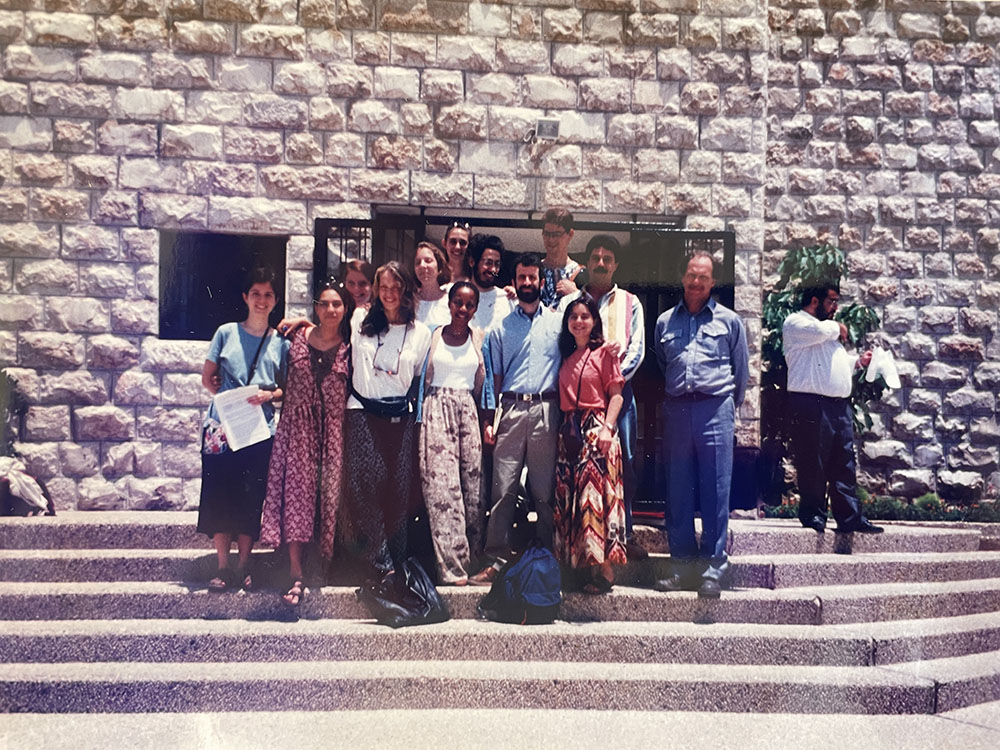
Here is one reason I hate the class: On the first day, the professor explained how he chose students from among those who applied for the limited spots. He wanted a diversity of backgrounds and viewpoints. He said that meant not all of us were the “best” applicants. Or maybe he said we weren’t all the “strongest.”
There are about a dozen of us in the class. Four students are Jewish or half-Jewish. There is a Pakistani woman. There is a Black woman from South Africa. There is a guy from the Netherlands. There are several American Christians, including a Quaker. There is a guy who is of ambiguous Mediterranean descent and hangs out with the socialist smokers at Swarthmore and is definitely pro-Palestinian. I consider him almost Arab. But by mid-semester he drops out.
I read between the lines when the professor says we weren’t all the “best.”
The professor believes in stories, narrative, self-reflection as pathways to defusing conflict. He makes us write a “reflexive” journal where we must reflect on how we think and feel about the readings, the class.
I hate the reflexive journal. I hate that we talk more about ourselves than about the history of the conflict. I hate that we never talk about power. I have definitely lived less than the professor and experienced less and I probably know less. He has lived in Israel, and I have never been. He has a Ph.D., and I am a junior in college. I should respect him more. Years from now, I will remember the class and tell myself, “You should have respected that professor more.”
But this is not a story about how he is right and I am wrong.
“As a tactic, anti-normalization is an attempt to fight back against the legitimization and whitewashing of Israel’s violations of Palestinian rights through the veneer of dialogue. An example of normalization would be a project which seeks to bring Israeli and Palestinian women together to discuss the respective challenges they face in society with no mention of the fundamental imbalance between them, an imbalance which routinely subjects Palestinian women to violence by the Israeli regime.
“Anti-normalization is not simply a principled stance, but also a political tactic that recognizes the defunct framework of Palestinian and Israeli dialogue and peace building that is not based on the fundamental principles of international law.”
—Yara Hawari, “The Revival of People-to-People Projects: Relinquishing Israeli Accountability”
I’m not Palestinian, but I once dressed up as Yasser Arafat for a Swarthmore Halloween party, and I have a Palestinian flag t-shirt I bought last summer while I interned at an Arab American civil rights organization in Washington, D.C. I wear the t-shirt the way other people my age wear Che Guevara or John Lennon or Malcolm X or Africa t-shirts, but my shirt is much less cool. When I wear the shirt at Swarthmore, an international student tells me, “You’re not American, are you?” He knows how little American students care about Palestine in 1994. I belong to my campus’ Middle East studies club, where we often get told our programming is too pro-Palestinian and not “balanced” enough. Nearly three decades later, Amnesty International would call Israel an apartheid state. But now, the campus chapter of Amnesty International gathers signatures in support of clemency for Jonathan Pollard, an American who spied for Israel.
I grew up with an Arab father, so I have spent my entire two decades of life obsessing about any news story involving Middle East politics. I went to a Saudi high school in Saudi Arabia, and so my education had different holes and biases than the educations of my peers who went to American high schools. I learned about the Balfour Declaration and not World War I. I learned about the Nakba and not World War II.
I also spent a good part of my childhood in Cleveland Heights, Ohio. Because of that, unlike many people I know in Saudi Arabia, I have met and been friends with Jewish people. Since elementary school, I’ve known a girl named Reema, whose family fled the Soviet Union and sought refuge in the U.S. and whose grandma, just like my father’s mother, doesn’t speak a lick of English. I am a voracious reader with a mother who digs up summer reading lists from her friends in America, so I have read the Diary of Anne Frank and A Tree Grows in Brooklyn, not as required reading, but because I wanted to. I grew up female in Saudi Arabia and lived through the Gulf War there, and so I am obsessed with freedom. The Intifada, Tiananmen Square, the fall of South African apartheid, the fall of the Soviet Union. These stories of people — especially young people — demanding freedom captured my attention in high school. They inspired me.
I know that I am living through a momentous time in history. The Oslo Accords were signed last year. Yasser Arafat and Yitzhak Rabin shook hands.
I want to be a part of it. I want to witness the conflict, and its ending, for myself.
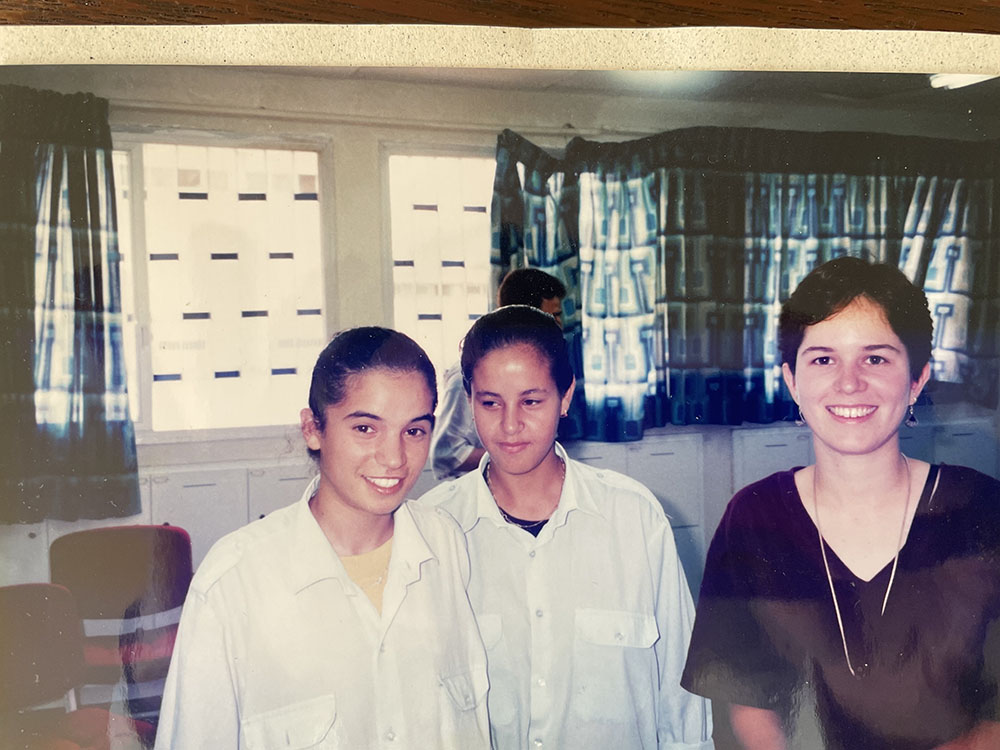
But in America, I get the feeling that when they find out I grew up in Saudi Arabia, people who don’t know me very well expect me to hate Jews. They expect me to hate Israel. In conflict resolution class, I’m not sure what perspective the professor and the other students expect me to have. Rightly or wrongly, I suspect at least some people think I’m biased. Rightly or wrongly, I particularly suspect this of the professor. In the classroom, I’m often on edge. I don’t want to explore both sides. I believe I’ve heard both sides. I want to talk about justice.
“The words escape him without the slightest hint of remorse. His stare, gray and rigid as stone; the kind of cold only a politician can know. You lock eyes with the Palestinian woman to whom he responded.
“‘So what you’re saying is, my mother, who was born in Haifa, cannot return to her home, but any random American Jew can?’ The exhaustion in her voice was familiar to you.
“‘Listen,’ the man sighs and removes his glasses. ‘I don’t know your mother, but I assume she can find a home in another Arab country; that’s how war works. If we were to accommodate every refugee who claims this land, that would be a logistical improbability. That would, in essence, be asking the state of Israel to commit suicide. I hope this answers your question.’”
—George Abraham, “In which you do not ask the State of Israel to commit suicide”
A month into the semester, tragedy strikes in the West Bank. 29 Muslims praying in the Ibrahimi Mosque in Hebron are massacred by a right-wing Israeli terrorist. Protests follow and more people, two dozen Muslims and nine Jews, die.
In our elite liberal arts school bubble, we have a big class discussion about whether to go to Israel and Palestine over spring break, or whether to postpone. Many people, including the professor, think it’s not the right time to go.
In an ongoing conflict, is it ever the right time? I wonder.
The group decides to postpone.
During our snack break that day, some of the women gossip in the bathroom and say annoyed things about how the professor is handling the situation. I am one of those gossipy, pissed-off people. Years from now, I won’t remember exactly what I said.
We don’t know that our professor is in the men’s room. We don’t know he hears us through the duct. He doesn’t tell any of us what he heard, or ask why we said what we said.
We don’t know that he decides, right then, on the spot, that he is over this class. He is done with us. He is going to check out for the rest of the semester.
Had Nakba been her neighbor,
my mom would’ve shamelessly chided her:
“I’m sick of the clothes on my back.”
And had Nakba been her older sister,
she would’ve courted her with a dish
of khubaizeh, but if her sister whined
too much, my mom would tell her: “Enough.
You’re boring holes in my brain. Maybe
we shouldn’t visit for a while?”
—Sheikha Hlewa, “Nakba,” trans. Fady Joudah
May 31, 1994. We arrive in Tel Aviv. In my travel journal (not my official reflexive journal), I write, “Palm trees and dust, but not as hot as I expected.”
Our itinerary has been created by a friend of the professor’s, Danny, an American-Israeli tour organizer.
We drive straight from the airport to the Negev desert to meet Israeli environmental artist Ezra Orion. Our professor and Danny want us to understand the strong connection Palestinians and Israelis have to the land. They want us to see the land, feel the land. We walk through an outdoor installation by Orion, past metal sculptures of human-like figures. We end up at the edge of a plateau.
“It was amazing and beautiful to see something so huge as a canyon suddenly appear,” I write in my journal. “But today we met few people, and I wonder how the awe we experienced today fits in with the purpose of our trip.” The words I write sound measured, but really, I’m annoyed.
Maybe, in 25, 30 years I’ll write this memory and think about erasure.
Tonight, our sleeping quarters are near a Bedouin field camp. A group of kids is making noise outside. Danny tells me I might need to tell them to be quiet because we’re getting up early and need sleep.
I note in my journal that Danny, the professor, our bus driver, and the armed guard we are required by law to travel with in the desert — none of them speaks enough Arabic to shush a bunch of kids.
“The professor continued, telling us this was completely ahistorical. What does history tell us? History says that even in circumstances arguably more hopeless than Palestine, organized people always triumph over systems of oppression. Always. So why not believe in Palestine’s liberation? Why not actually believe that the liberation of Palestine is not only plausible but inevitable?
“The room was silent.”
—George Abraham, “Imagining a Free Palestine: an ekphrasis on a fragmented nationalism”
The next day, we wander around the desert and eat lunch in a cave. Everyone wears t-shirts, hats, shorts. Suitable clothing for a trek. I, for some reason, have brought my black abaya and tarhah, the robe and scarf I had to wear whenever I went out in public in Saudi Arabia. I wear these pieces of clothing in the hot desert sun. I sweat under my scarf. The black material is hot to the touch.
Our professor says, “Why is it black? Why would anyone think it’s a good idea to wear black in the hot sun?”
I should think, “You’re fucking right. Why am I forced to wear black?”
But instead, I’m just annoyed and obstinate and protective of my culture. I wear the abayah and tarhah until lunchtime. I wear my ethnicity like clothing.
Our guide this morning is a man named Yisrael who came to religion through his experiences in the desert. He tells, in the first-person point of view, the story of the Israelites fleeing Egypt. He says they waited for word from God on how to conquer their enemies, waited for Moses to return with weapons. When Moses arrived, he brought only the Torah and the words “Love thy neighbor.”
Our guard sleeps under a tree, his unloaded gun hanging from a branch.
Before we leave the Negev, we meet with a group of Bedouins. Along with Amer, an Israeli-Arab Bedouin with a Ph.D. in political science from a German university, I help to translate. In their tent, the Bedouin men serve us cardamom-laced coffee and talk about hospitality, not being able to build on their own land, serving in the Israeli military, feeling less-than when they’re not in uniform. They say, though the Turks and the British ruled the land before the Israelis, only the Israelis took their land. They say they have patience and trust in God. They seem to believe the Israelis will go, as others before them went, “back to where they came from.” I wonder where they think the Jews could possibly go.
Amer tells me and a few of the others that he can’t find an academic job in Israel. If he doesn’t find a position by year’s end, he plans to immigrate to Canada or the U.S. He feels that the Israeli government is trying to force Arab intellectuals to leave.
Later, on the bus, Danny complains to our professor about the Bedouins’ inability to accept Jewish Israelis, their view of them as just another colonizer.
I wonder, what does it mean to listen to another person’s side? Does it have to change us? Should it?
Colonizers write about flowers.
I tell you about children throwing rocks at Israeli tanks
seconds before becoming daisies.
I want to be like those poets who care about the moon.
Palestinians don’t see the moon from jail cells and prisons.
It’s so beautiful, the moon.
They’re so beautiful, the flowers.
—Noor Hindi, “Fuck Your Lecture on Craft, My People Are Dying”
After we leave the Negev, we start to meet more people. We talk to Palestinian Authority leaders, Arab-Israeli high school students in Ramla, and Palestinian college students in Birzeit. We meet a guy who’s training to bodyguard for Yasser Arafat. He invites us to his house where the women feed us maqloobah.
A girl at the high school tells a couple of us, “The Jews do not want to share the government with Arabs in the same way whites in America don’t want to share power with Negroes.” It’s an outdated word. Has she been reading Baldwin, Martin Luther King Jr., Malcolm X?
We meet Israeli officials, Jewish settlers in the West Bank, kibbutzniks. We split into small groups to have shabbat dinner with Israeli families. Daniel, the Norwegian student, and I are hosted by an American-Israeli playwright, Joyce, who holds workshops with young Arabs and Jews, including Russian immigrants, and dramatizes their experiences.
I love hearing about her work. The way she’s melded art and social conscience is, I write in my journal, “something I would very much like to achieve in my own writing.”
Joyce tells me to visit the United States Holocaust Memorial Museum in Washington, D.C., where I’ll be interning at a Middle East studies center after the peace studies mission is over. She tells me that for Jews, the memory of the Holocaust either evokes the need to prevent any kind of human suffering or strengthens a resolve to protect Jews from ever being persecuted again — even at the expense of others.
“Your Palestinian American friends are not ok. You have a Ukrainian flag on your profile but ignore our posts re kids being bombed in Gaza. You want to ‘stick together’ on Roe but aren’t mad re Palestinian women being murdered. This is not allyship. It’s not even friendship.”
At the Wailing Wall, the Jewish women praying and rocking remind me of women praying at the holy mosques in Makkah and Madinah. When Sana, the one other Muslim student, and I visit the al-Aqsa Mosque and the Dome of the Rock, up on the Temple Mount, we have to prove we are Muslim by reciting al-Fatihah, the first chapter of the Qur’an. We have to do this several times. Eventually, a Palestinian man offers to show us around the al-Aqsa Compound. He claims to have visited Chicago once with a friend to get weapons because “We Palestinians have no weapons.” He says he fled Chicago because it’s too dangerous.
“Mafia,” he says.
When I tell the professor about meeting the man who claimed to be a gun runner, the professor says, “Why would he tell you that?”
I am pleased that my Arabic gives me access to things the professor can’t hear or see. It will be many years until I understand his concern. Why would he tell you he’s a terrorist?
I wish I were born in Denmark instead, with blond hair and blue eyes. But I wasn’t!
—Nas Daily (Nuseir Yassin)
Toward the end of the trip, the professor reveals his secret. We are sitting in a circle in a room — where? Years from now, trying to piece together a memory, I will think maybe we were sitting in a place called Open House in Ramle, a home that once belonged to Palestinians who were forced to flee in 1948. That year, an Israeli family settled in the empty house. In 1967, one of the Palestinians members returned to visit his old home, and the daughter of the Israeli family who lived there learned, for the first time, that the Palestinians did not flee willingly. Years later, she turned the house into an educational center for Arab children and a Jewish-Arab coexistence center, a story Sandy Tolan tells in his book The Lemon Tree: An Arab, a Jew, and the Heart of the Middle East.
Perhaps that is where we are sitting in a circle — a room devoted to cross-cultural understanding — when the professor tells us about overhearing our complaints in the bathroom back in February.
In the circle, he tells us about giving up. I realize this class, this mission, has been as hard for him as it has been for me. I have felt at times that I’m being asked to set aside who I am in the name of objectivity. I have felt at times that who I am is taken for granted. I have wondered constantly how this conflict we are studying will ever be solved. I have wondered what right I have to be here and observe — judge — the lives and opinions of others.
After the professor confesses, members of the class unload their pent-up feelings. It is not lost on anyone that our group is a sort of microcosm of the conflict surrounding us.
And yet it’s not. Our petty squabbles are nothing like what we are here to witness.
For me and for most Palestinians, it’s not a conflict, it’s ethnic cleansing, it’s genocide, it’s apartheid, it’s discrimination — the list goes on.
We return to the U.S., and history keeps marching forward. A Jewish terrorist assassinates Yitzhak Rabin. Palestinians mark the 50th anniversary of the Nakba. There is a second intifada. Israel allows settlers to build more settlements. There are elections in the West Bank and Gaza Strip. Israel blockades Gaza. Israel allows settlers to build more settlements. There are the Palestinian uprisings of 2014 and 2015. Bibi Netanyahu seems to never go away. Palestinians make several Marches of Return. There is Boycott, Divestment, Sanctions. There is anti-Boycott, Divestment, Sanctions. Palestinians mark the 70th, 71st, 72nd, 73rd, 74th anniversaries of the Nakba. The United States moves its embassy to Jerusalem. Jared Kushner releases a plan, his so-called “deal of the century.” UAE, Bahrain, and Morocco normalize ties with Israel. Human Rights Watch issues a report: The Israeli government has committed crimes of apartheid under international law. Amnesty International finally agrees.
Palestinians say, We told you all along.
“Because there may be bombing tonight in Gaza, I’m telling my children that they may hear thunder and see lightning in the sky. So they better go to bed early if they don’t like these natural phenomena. For me, I’m sure it’ll rain, but whom is it going to soak with blood?
I look back on 1994. I believed one day, Palestinians would be free. One day, there would be peace. I believed witnessing could make a difference. The me of 30 years ago tries to imagine the future of Palestine, because there must be a more just future than this one, and justice for Palestinians — couldn’t that be a model for justice everywhere?



